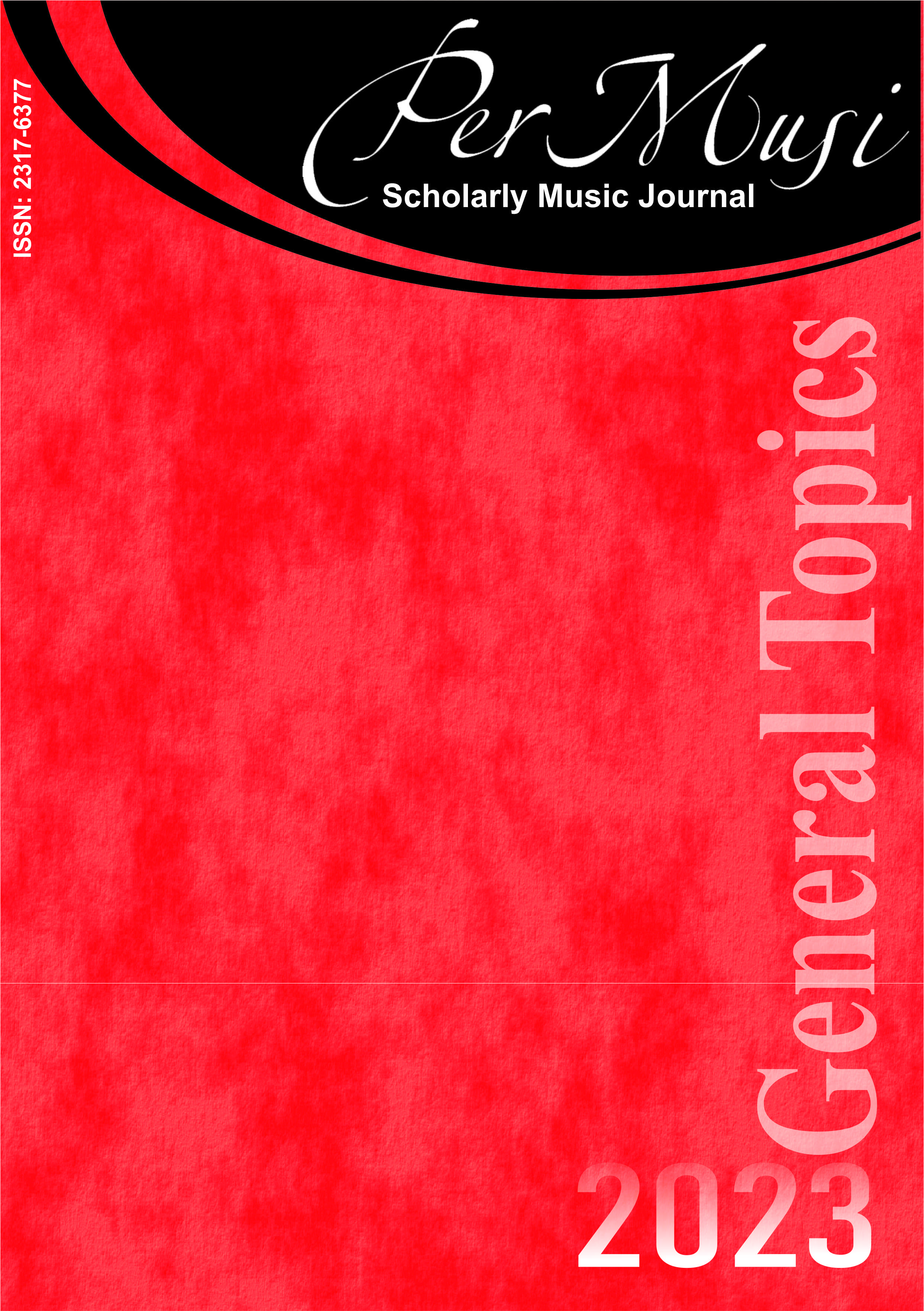The Preparation for Musical Performance by Guitar Quartet from the point of view by Professional Guitarists
DOI:
https://doi.org/10.35699/2317-6377.2023.45993Keywords:
Guitar Quartet, Practice Planing, Rehearsal strategies, Chamber Music, Practice OptimizationAbstract
In this article, strategies for chamber music performance by guitar quartets were raised and discussed, considering the point of view Brazilian Professional Guitarists. The study was developed based on authors who deal with musical performance planning and discuss performance preparation techniques and procedures, especially for chamber music. Through a questionnaire applied to guitarists who work and have worked in Brazilian Quartets, we sought to raise rehearsal strategies applied to practice by these groups, through questions about the planning and performance of their rehearsals, techniques and strategies for individual and collective study, availability of time, interpersonal relationships and integrations and musical interpretation, and their interactions. The analysis of the compiled material showed the most used procedures in their practices, and presented guidelines for their optimization, contemplating specificities of the chamber music of the guitar quartet.
References
Barros, Luís Cláudio. 2008. “A pesquisa empírica sobre o planejamento da execução instrumental: uma reflexão crítica do sujeito de um estudo de caso.” Porto Alegre, 2008. 265f. Tese (Doutorado em Música: Práticas Interpretativas) – Universidade Federal do Rio Grande do Sul, Porto Alegre.
Chaffin, Roger; Imreh, Gabriela. 1997. “Pulling teeth and torture: Musical memory and piano performance.” In: Thinking and Reasoning. v. 3, p. 315-336. DOI: https://doi.org/10.1080/135467897394310
Davidson, Jane; Ford, Luan. 2003. “An investigation of members’ roles in wind quintets”. Psychology of Music. v 31, nº 1, p. 53-74. DOI: https://doi.org/10.1177/0305735603031001323
Davidson, Jane; Good, James. 2002. “Social and Musical Co-Ordination between Members of a String Quartet: An Exploratory Study.” Psychology of Music. v. 30, p. 186-201. DOI: https://doi.org/10.1177/0305735602302005
Davidson, Jane W.; King, Elaine C. 2004. “Strategies for Essemble Practice.” In: Musical Excellence edited by Aaron Williamon, 105 – 122. New York: Oxford University Press.
Davidson, Jane W.; Williamon, Aaron. 2002. “Exploring co-performimg communication.” Musicae Scientiae. v.1, n.1, p. 53-72. DOI: https://doi.org/10.1177/102986490200600103
Ericsson, K. Anders; Krampe, Ralf Th. 1995. “Deliberate practice and elite musical performance.” In The practice of performance – studies in musical interpretations edited by RINK, John, 84 – 102. Cambridge: Cambridge University Press. DOI: https://doi.org/10.1017/CBO9780511552366.005
Ginsborg, Jane. 2004. “Focus, effort, and enjoyment in chambre music: Rehearsal strategies of successful and “failed” student ensembles.” In International Symposium on Performance Science.
Goodman, Elaine. 2002. “Ensemble Performance”. In Musical Performance: A Guide to Understanding edited by John Rink, 153 – 167. Cambridge: Cambridge University. DOI: https://doi.org/10.1017/CBO9780511811739.012
Hallam, Susan. 1995. “Professional musicians approaches to the learning and interpretation of music.” Psychology of Music. V.23, p. 111-128. DOI: https://doi.org/10.1177/0305735695232001
Jorgensen, Harald. 2004. “Strategies for individual practice.” In Musical Excellence edited by Aaron Wiiliamon, 85 – 104. New York: Oxford University Press.
King, Elaine. 2004. “Collaboration and the study of ensemble rehearsal.” In Proceedings of the 8th International conference on music perception and cognition. Evanston, IL.
King, Elaine. 2006. “The roles of student musicians in quartet rehearsals.” Psychology of Music. V. 34, nº2, p. 262-282. DOI: https://doi.org/10.1177/0305735606061855
Klickstein, Gerald. 2009. “The Musician’s way: A guide to practice, performance, and wellness.” Oxford: University Press.
Kokosaki, Dimitra. 2007. “Understanding the ensemble pianist: a theoretical framework.” Psychology of Music. Society for Education, Music and Psychology Research, vol 35(4): 641‒668. DOI: https://doi.org/10.1177/0305735607077835
Krampe, Ralf. 2002. “Aging, expertise and fine motor movement.” In Neuroscience and Biobehavioral Reviews. V. 26. P. 769–776. DOI: https://doi.org/10.1016/S0149-7634(02)00064-7
Murnighan, J. Keith; Conlon, Donald. 1991. “The dynamics of intense work groups: A study of British string quartets.” Administrative Science Quarterly. V. 36, p. 165–186. DOI: https://doi.org/10.2307/2393352
Ray, Sonia. 2005. “Os conceitos EPM, Potencial e Interferência inseridos numa proposta de mapeamento de Estudos sobre Performance Musical.” Performance Musical e suas Interfaces edited by Sonia Ray, 39-65. Goiania: Vieira/Irokun.
Reid, Stefan. 2002. “Preparing for performance.” In Musical Performance: A Guide to Understanding edited by John Rink, 102 - 112. Cambridge: Cambridge University. DOI: https://doi.org/10.1017/CBO9780511811739.008
Rink, John. 1995. “The practice of performance – studies in musical interpretation.” Cambridge: Cambridge University Press. DOI: https://doi.org/10.1017/CBO9780511552366
Rink, John. 2002. “Performance: A Guide to Understanding.” Cambridge: Cambridge University Press.
Rink, John. 2002. “Analyses and (or?) performance.” In: RINK, John (org.). Musical Performance: A Guide to Understanding edited by John Rink, 35 – 58. Cambridge: Cambridge University Press. DOI: https://doi.org/10.1017/CBO9780511811739.004
Sloboda, John. 2008. “A mente musical: A psicologia cognitiva da música.” Tradução de Beatriz Ilari e Rodolfo Ilari. Londrina: EDUEL.
Williamon, A. 2004. “Musical Excellence – strategies and techniques to enhance performance.” Oxford: Oxford University Press. DOI: https://doi.org/10.1093/acprof:oso/9780198525356.001.0001
Published
Issue
Section
License
Copyright (c) 2023 Per Musi

This work is licensed under a Creative Commons Attribution 4.0 International License.

Except where otherwise noted, contents on this site are licensed under a Creative Commons - Atribuição 4.0 Internacional.


